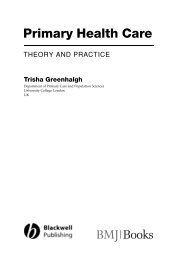DOING BUSINESS 2009 - JOHN J. HADDAD, Ph.D.
DOING BUSINESS 2009 - JOHN J. HADDAD, Ph.D.
DOING BUSINESS 2009 - JOHN J. HADDAD, Ph.D.
Create successful ePaper yourself
Turn your PDF publications into a flip-book with our unique Google optimized e-Paper software.
2 Doing Business <strong>2009</strong>gal149RMSa157RMSFasoSne181FIGURE 1.2Eastern European andCentral Asian economies—leaders in Doing Business reformsShare of economies with at least 1 reformmaking it easier to do business in past 5 years (%)by Doing Business report yearEastern Europe & Central Asia(28 economies)DB2005DB2006DB2007DB2008DB<strong>2009</strong>East Asia & Pacific(24 economies)DB2005DB2006DB2007DB2008DB<strong>2009</strong>Middle East & North Africa(19 economies)DB2005DB2006DB2007DB2008DB<strong>2009</strong>Sub-Saharan Africa(46 economies)DB2005DB2006DB2007DB2008DB<strong>2009</strong>OECD high income(24 economies)DB2005DB2006DB2007DB2008DB<strong>2009</strong>South Asia(8 economies)DB2005DB2006DB2007DB2008DB<strong>2009</strong>22253846334630Latin America & Caribbean(32 economies)DB2005DB2006DB2007DB2008DB<strong>2009</strong>25Source: Doing Business database.384747535350505063636552615056507571796363638293898293Two-thirds of its economies reformed,up from less than half last year (figure1.2). The Middle East and North Africacontinued its upward trend, withtwo-thirds of its economies reforming.In a region once known for prohibitiveentry barriers, 2 countries—Tunisia andYemen—eliminated the minimum capitalrequirement for starting a business,while Jordan reduced it from 30,000Jordanian dinars to 1,000.Sub-Saharan Africa continued itsupward trend in reform too: 28 economiesimplemented 58 reforms, morethan in any year since Doing Businessbegan tracking reforms. Two West Africancountries led the way, Senegal andBurkina Faso. In Latin America, Colombiaand the Dominican Republic were themost active. OECD high-income economiessaw a slowdown in reform. So didSouth Asia.Azerbaijan is the top reformer for2007/08. A one-stop shop for businessstart-up began operating in January 2008,halving the time, cost and number ofprocedures to start a business. Businessregistrations increased by 40% in thefirst 6 months. Amendments to the laborcode made employment regulation moreflexible by allowing the use of fixed-termcontracts for permanent tasks, easingrestrictions on working hours and eliminatingthe need for reassignment in caseof redundancy dismissals. And propertytransfers can now be completed in 11days—down from 61 before—thanks toa unified property registry for land andreal estate transactions.That’s not all. Azerbaijan eliminatedthe minimum loan cutoff of $1,100 at thecredit registry, more than doubling thenumber of borrowers covered. Minorityshareholders enjoy greater protection,thanks to amendments to the civilcode and a new regulation on relatedpartytransactions. Such transactionsnow are subject to stricter requirementsfor disclosure to the supervisory boardand in annual reports. Moreover, interestedparties involved in a related-partytransaction harmful to the companymust cover the damages and pay backpersonal profits.Taxpayers in Azerbaijan now takeadvantage of online filing and paymentof taxes, saving more than 500 hours ayear on average in dealing with paperwork.And a new economic court in Bakuhelped speed contract enforcement. Withthe number of judges looking at commercialcases increasing from 5 to 9, theaverage time to resolve a case declinedby 30 days.Albania is the runner-up, with reformsin 4 of the areas measured byDoing Business. A new company lawstrengthened the protection of minorityshareholder rights. The law tightenedapproval and disclosure requirementsfor related-party transactions and, forthe first time, defined directors’ duties.It also introduced greater remedies topursue if a related-party transaction isharmful to the company. Albania madestart-up easier by taking commercial registrationout of the court and creating aone-stop shop. Companies can now starta business in 8 days—it used to takemore than a month. The country’s firstcredit registry opened for business. Andtax reforms halved the corporate incometax rate to 10%.Africa—more reform thanever beforeEconomies in Africa implemented moreDoing Business reforms in 2007/08 thanin any previous year covered. And 3of the top 10 reformers are African:Senegal, Burkina Faso and Botswana.Three postconflict countries—Liberia,Rwanda and Sierra Leone—are reformingfast too (figure 1.3). Mauritius, thecountry with the region’s most favorablebusiness regulations, continues toreform, and this year joins the top 25 onthe ease of doing business.This focus on reform comes afterseveral years of record economic growthin Africa. Annual growth has averagednearly 6% in the past decade, thanks tobetter macroeconomic conditions andgreater peace on the continent. Withmore economic opportunities, regulatory(c) The International Bank for Reconstruction and Development / The World Bank
















